Table of Contents
I am going to do something different with this post.
It has always been about strategy and processes for the last two+ years.
Since the latest core update has been tremendous, I want to review how our projects, my website, and clients are doing.
We’ll review websites in different industries, including our businesses, affiliate websites, and client websites.
I will also tell you what I am planning for our future since I believe it’s time I leave the mickey mouse game to the juniors and step in the ring with the powerhouses of each industry.
Dates to consider
Google announced a core update on May 25th, 2022.
I believe they started the update before May and ended it in mid-June. I won’t get into conspiracy theories, as this is not what the post is about.
You can check the SERP volatility score on SEMrush to get a (somewhat) accurate reading of when and what was affected during the update.
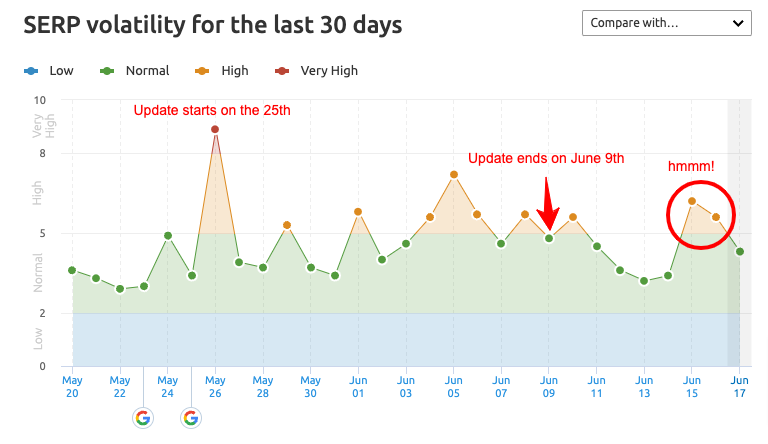
A lot of people got hit (I got hit slightly). A few individuals on Twitter said they’re doing better, but not many.
I (like many others) believe this is an authority move where larger websites are taking up more and more real estate on SERPs versus the smaller kids on the block. It’s all anecdotal, and I don’t have proof, but it feels like this is the move Google is taking for its future.
Where I see movement
I work in several industries and can access quite a bit of data.
Our data lets me see what industries Google is shaking up on their index.
For the time being, I have access to industries such as:
- Construction
- Hospitality
- Health
- Manufacturing
- Big pharma
- Home improvement
- Fitness
Some of these industries break off into multiple niches.
Keep in mind that most are actual businesses. Some are affiliate websites, and a couple are content websites for display advertising.
Our team has access to a perfect number of web assets to judge how an algorithm update behaves.
None of what I am going to mention in this post is scientific. I am simply sharing data and how we’re doing after one of the most significant Google algorithm updates.
Let’s talk stats & data
We own several web assets in the construction niche. These are real businesses dealing with real people.
We also own web assets in health, hospitality, and homecare.
The examples below are a mix of our top-grossing web assets.
Example 1:
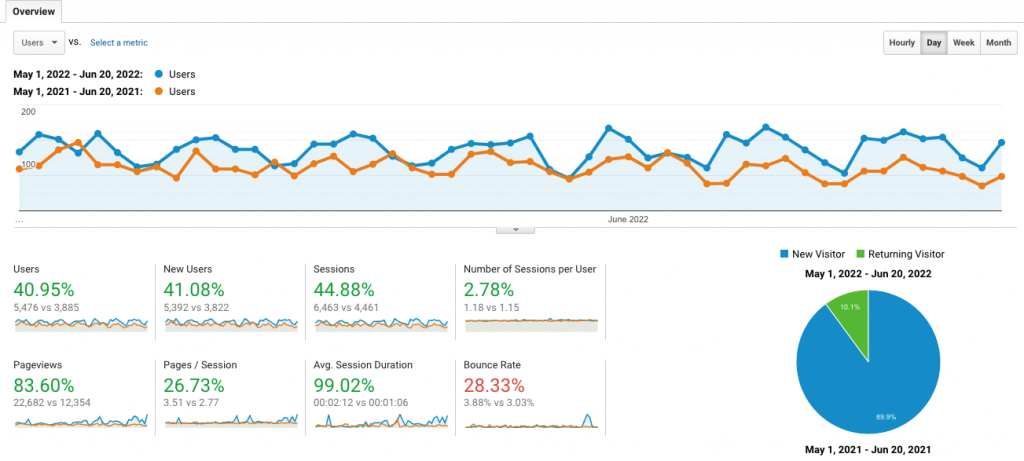
It looks like not a lot happened with this website when we compare our data to the previous year other than steady growth.
Example 2:
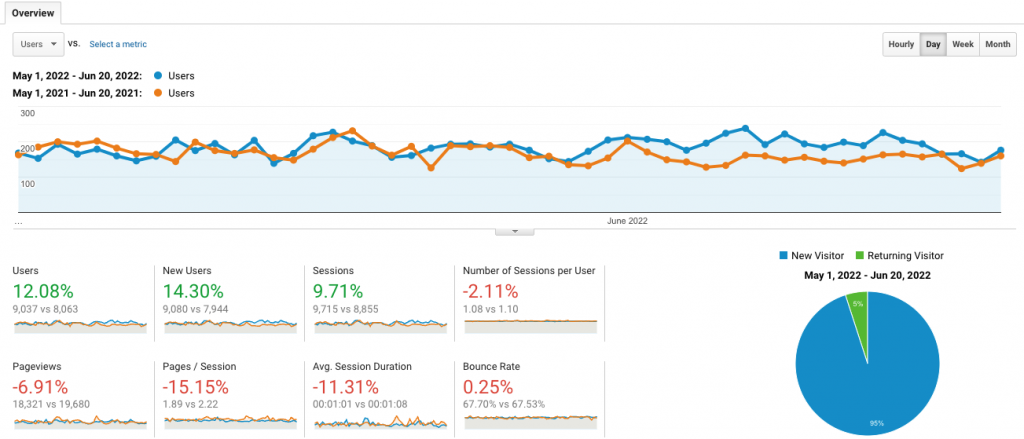
Here’s another web asset that’s a real business. Again, nothing much to report other than steady growth.
We’ve updated the design on this website, so some data points have changed, but I don’t think it’s negative.
Example 3:
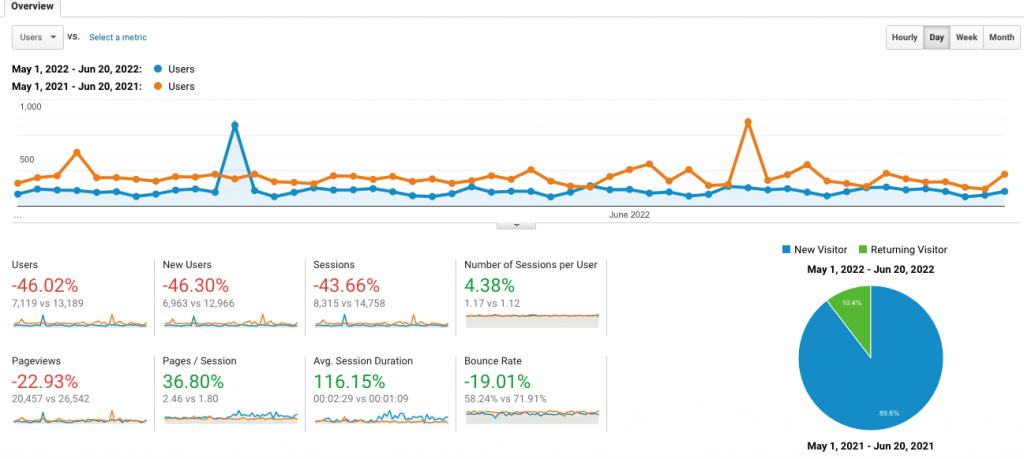
This website is interesting because it blew up during the pandemic but has come back to reality in 2022.
I don’t see a positive or negative correlation to the algorithm update.
Surprisingly, it’s our most profitable web asset.
Example 4:
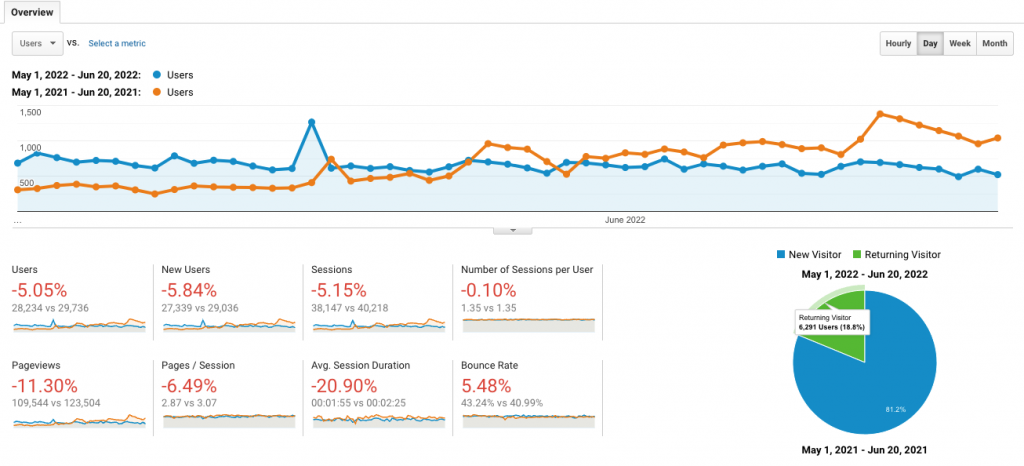
Here’s a web asset in the hospitality niche.
This website did very well after the economy opened up in 2021. It has, since then, come back to reality in 2022.
I don’t see a positive or negative effect from the algorithm update.
Example 5:

The last example is an affiliate website, and it did get hit. Not by much, but it’s significant.
This website lost about 20% of its traffic. It’s still up and down, and I don’t think I’ll know the complete picture until July and August.
I am changing my game for this web asset by improving content, removing flawed pages/content, and getting better links.
I’ll stay the course for now. The only difference will be better content and authors.
So what happened
Every single website with a real business did okay, and I saw no changes in traffic or leads.
Our websites with affiliate content and display ads did get hit. All of them!
Luckily, the update didn’t crush my traffic or rankings. It was a nudge to improve our process.
To be honest with you, I was going to improve content strategy and hire better authors anyway.
This update just pushed my timeline to improve quality.
Where our company is headed
Before the May 25 update, our team had a serious sit-down to discuss content quality.
Our conversation included media, photography, written content, and landing pages.
So what are we planning on doing differently?
- We’ll find experts in each niche we work on and have them speak on our behalf. These are doctors, nurses, pharmacists, engineers, instructors, or professors. In some cases, they’re employees, and in other cases, they’re subcontractors.
- Each content piece will go through a process. The media team will story-board it with the copywriter, the engineer will help guide our approach and verify facts, the designer(s) will put visuals that will make more sense than photos, an editor finalizes content, and the developer will publish the content. The project manager ensures everything runs smoothly.
What we will no longer do:
- Hire general writers who regurgitate content from around the web.
- Having the project manager edit content.
- Publish content without our media. We don’t want to be “basic” any longer and have been doing very well with video, so we’ll continue doing what works.
My takeaway
I am not sure what to say.
It’s the same old game we’ve always been playing. Google releases a core update, and everyone panics.
I’ve been doing this for 20+ years and have never been hit with a penalty. I was shamed into thinking I am not an SEO if I haven’t been hit.
F that!
I dominate every sector I work in. I’ve generated more than $200 million for our companies (and clients) in the last 10+ years.
What do I think? I think content and affiliate websites got rocked this round.
Real businesses didn’t see much change; if they did, it’s negligible.
We’ll continue improving each day, week, month, and year—nothing to see here.
That’s all I have for this month. Until next time, catch you all on the next post.

